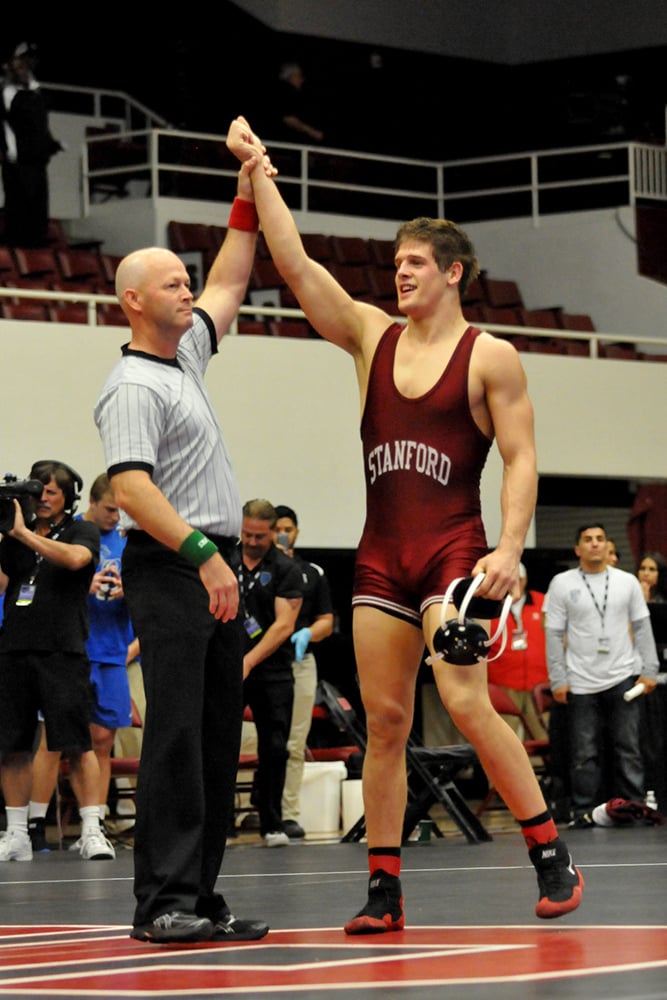“Two! Two! That’s two! TWO! TWOOOO!”
It wasn’t just the trio of coaches who rocketed out of their chairs as if their seats had suddenly become red-hot, screaming at the tops of their lungs for points to be awarded while pointing at the two tangled bodies on the far side of the black mat. It was also the pair of athletes standing behind their coaches at the edge of the mat, voicing their displeasure to the referee as they jumped up and down. And it was also the section of fans clad in cardinal red that bounded to its feet in unison, yelling and gesturing, filling the vastness of Maples Pavilion with its collective voice.
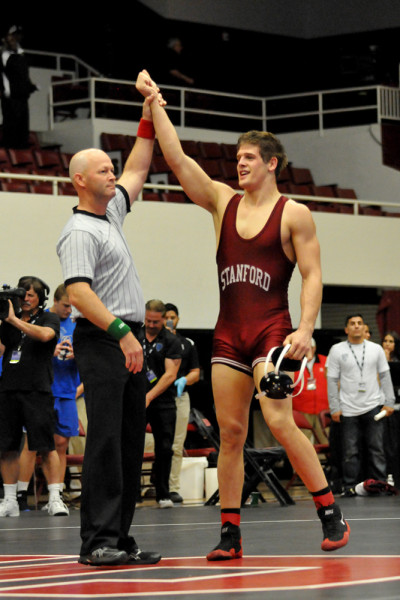
The referee stared intently at the squirming knot of bodies at his feet, analyzing the placement of the limbs, the forces being exerted in all directions and the raw determination of two individuals, each straining with all his might to overcome the other.
All of a sudden, his left hand shot up, two fingers pointed skyward, extensions of an arm wrapped with a red sweatband. Two points, red.
The whistle signaling the break of the tie — and the end of the match — was lost in the overwhelming roar that arose from the small Stanford section of the bleachers. Although there couldn’t have been more than 200 of them, the din that they raised was akin to the pandemonium after a game-winning buzzer-beater or a walk-off home run.
Senior Dan Scherer stood in the center of the mat with an exhausted yet triumphant grin, hand held high by the referee signaling his victory — one more tally in the most successful season in team history and one final conquest in front of the Stanford faithful.
On Sunday, that roar inside Maples Pavilion wasn’t for a double alley-oop for Cardinal men’s basketball, nor was it for another conference title for women’s basketball. Instead, it was in recognition of Stanford wrestling — a team largely overlooked and forgotten that had faded into relative obscurity on campus — because on Sunday, with the Pac-12 Championships held on the Farm for the first time since 2006, the team capped off a regular season in which it thundered back to relevance, establishing a presence that looks to be here to stay.
***
Walking into the wrestling room in the basement of the Arrillaga Family Sports Center two days before the Pac-12 Championship, you can feel it in the air. No, not the hint of stale sweat left over from tireless weeks of preparation. You can feel the energy, the buzz and the camaraderie of the group of individuals sprawled out on the dull red mat. Looking around, you get the sense that the term “group of individuals” doesn’t quite do justice to the young men completely at ease throwing around playful banter or casually practicing pinning each other. This is a team, in every sense of the term.
From the 5-foot-2, 125-pound Evan Silver to the 6-foot-1, 285-pound Josh Marchok, the members of this team have forged a bond through their combined successes and failures in a historic season, one in which they are looking to capture the first conference title in school history after breaking the school record for the most dual-meet wins in a season. For veterans like fifth-year senior Ryan Mango, the season has been a testament to just how much the program has improved in such a short period of time — from just eight dual wins during the 2008-2009 season to 17 this season.
“When I first came here, that was really the emphasis, even when I was being recruited here,” Mango said. “[Head coach Jason] Borrelli emphasized trying to turn the program around and being in a program that’s respected, and really making that change happen rather than talking about it. So throughout the past four or five years, we’ve had our ups and downs and…it’s finally paying off a little bit this year.”
Mango is one of the established leaders of the team. A two-time All-American and three-time competitor at national tournaments, he is one of the most experienced wrestlers in the country and will be looking to claim his second consecutive Pac-12 title after redshirting his senior year while moving up weight classes from 125 pounds to 133. His 106 career wins speak for themselves. Even more so, it’s his maturity and perseverance outside competition that have been significant to not only the team, but also to the development of head coach Jason Borrelli, whose young coaching career was profoundly affected by Mango’s actions during the wrestler’s time at Stanford.
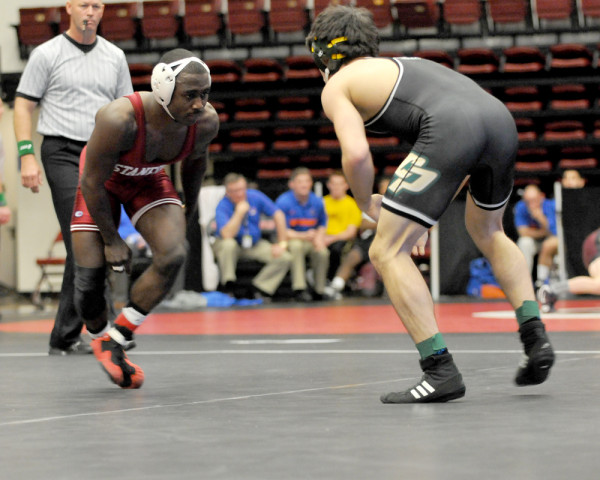
“You’d like to think as a coach that you’re doing a lot of teaching and coaching, but Ryan has actually helped our coaching staff in so many ways,” Borrelli said. “Little things about persevering through injuries, and for me as a young coach who was still trying to…figure out the mindset of a student-athlete, Ryan is one of the first kids that I remember kind of changed the expectations that I’ve put on young kids.”
Mango particularly impacted Borrelli’s mindset during his sophomore year, when he was injured leading up to the national tournament and was strongly discouraged by doctors from wrestling at the championships after not having trained for several weeks. But Mango just wouldn’t give in. He wanted to be an All-American, and partially torn ligaments weren’t going to stop him from achieving his goal.
“I’m sitting here trying to tell him he’s not going to be able to wrestle and he can’t be an All-American,” Borrelli said. “And he’s telling me the exact opposite, and I grew a lot as a coach and I recognized that there are kids that are motivated at a different level at that age. For a long time, I thought that a kid didn’t reach that until he was much older. And so now as a coach, the expectation from our staff has been, you come in as a freshman and you expect to win.”
Mango competed at the NCAA Championship that year wearing knee braces. He finished sixth in the 125-pound tournament and achieved his goal of earning All-American honors.
This toughness symbolized a turning point and resurgence in Stanford wrestling, a dramatic turnaround fueled at least in part by the success of a young Ryan Mango and its effect on a young head coach, as well as the emergence of star wrestler and NCAA Championship runner-up Nick Amuchastegui ‘11. The increased expectations placed on freshmen, spurred by the development of that 2009 recruiting class – Mango, Kyle Meyer and Bret Baumbach — and the mutual learning between player and coach are especially evident in the 2014 team, set to be one of the best — if not the best in school history.
“We came in, and we were the worst team in the Pac-12 and we were pretty far down there coming in my freshman year,” Meyer said. “To kind of see the atmosphere and see the people coming in behind us — the new recruits, they’re just getting better and better. And it’s exciting that we started the legacy…We’re starting a new decade of Stanford wrestling being in the top 25, at least, and competing for a national championship at the NCAAs.”
***
This year’s Stanford wrestling squad marked the convergence of two critical groups — the seniors who had paved the way for freshmen to excel, and the freshmen who embraced their potential to help turn over a new leaf for the program. With the groups coming together, a distinct dynamic emerged in which the entities mutually aided one another: While the veterans helped ease the freshmen’s transition into the collegiate game, the freshmen, in turn, helped the veterans by bringing a new spark to the team that quickly became infectious and motivating.
“I don’t think our seniors and juniors view our freshmen as freshmen, although they are,” Borrelli said. “They view them as guys who can do really well. And so when that happens, it just brings a different mindset to the whole program…In just having one or two freshmen that are having really good years, it motivates everybody.”
“It’s my fifth year here, so I’ve gone through a lot of grind,” Meyer added. “Next year, I don’t have to do the three-mile run or this workout or really grueling stuff, but when you look at those [young] guys, they’re really excited, and it brings in, ‘hey, wrestling is fun and competing is fun,’ so it kind of helps bring it back into perspective.”
Not only did the freshmen bring with them confident and enthusiastic mindsets, they also brought superb talent that made an immediate impact on the team. The youth movement was led by redshirt freshman Jim Wilson, who finished the regular season ranked 18th in the country in the 165-pound weight class.
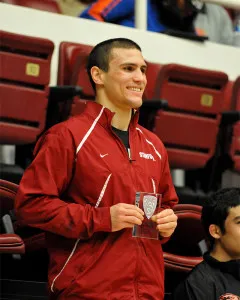
Armed with the talent to make a big splash in the standings, Borrelli and the Cardinal plunged into the season with confidence and excitement, hoping that a deeper roster would lead them back to national prominence.
“We set a goal at the beginning of the year to make this kind of a year of firsts,” Borrelli said. “A season of firsts, meaning that we wanted to win the first conference championship, we wanted to have the most dual meet victories in a season, we wanted to send the most individuals to the national tournament.”
After the Cardinal easily put away dual victories over Cal Baptist, Menlo College and Air Force to open the season before scraping past Maryland, it pulled off a tough road upset of then-No. 17 Michigan that Wilson identified as a defining point in the season.
“Coach Borrelli had told us how good we could be and we’d done all the training,” Wilson said. “I think when we beat Michigan, it was a realization. Everyone went, ‘Oh, wow. We can actually hang in there with those guys. We can beat those best teams.’ So it was like the first step in everyone realizing, ‘Wow, we can actually do this.’”
Even though the Cardinal hit its share of bumps while it plowed through its dual schedule, Borrelli saw the potential in his team and believed that the team’s ability to bounce back from tough losses displayed a maturity and resilience demonstrative of its mental toughness, which was another element that set it apart from the teams of years past.
“We have just never fallen too far, even when we’ve gotten knocked down,” Borrelli said. “I was interested to see how we were going to respond [to tough losses], and we never stayed down. Every time we got knocked down, it took us only the next match to get back up…That’s when you know our kids’ minds are strong.”
And indeed, the Cardinal never dropped consecutive matches while navigating itself to a 17-5 dual meet record to set the new school record for dual victories in a season, and three of its losses were decided by less than ten points. With wins over schools like Michigan, Central Michigan and Boise State, the Cardinal indeed showed itself — and the nation — that it could contend with some of the best teams in the country.
Although the Cardinal caught a solid groove towards the end of its season as it rolled to eight straight dual victories in a one-month stretch spanning late January and early February, it suffered a major setback when senior Bret Baumbach, co-captain and defending Pac-12 title winner, suffered a knee injury that cut his career short and sent him to the bench for the rest of the season. With the loss of Baumbach, the Cardinal was down one of its stalwart cornerstones.
In the wake of such a significant loss, the Cardinal could have folded and allowed the forfeiture of Baumbach’s production on the mat to hinder its progress moving into the finale of its season.
“If Bret had pity on himself, it would have hurt the team,” Wilson said.
But Baumbach, who had seen and experienced the meteoric transformation of the program firsthand during his five years as a Stanford wrestler, refused to drag the team down with him and made the most of an unfortunate turn of events with his leadership and positivity. If he couldn’t make an impact on the mat, he was going to be sure to make an impact off of it.
“Even though he tore both ligaments in his knee and he was completely out, he’d come in every day, giving everybody high-fives, telling them how great they were going to do, giving guys back massages, trying to keep them loose and pumping everybody up,” Wilson said. “Bret’s just such an incredible guy that he took that injury and just turned it into a ton of positive energy just to try to uplift the entire team. It was really through Bret’s example that built everybody up.”
The record-breaking season, the shared perspective and Baumbach’s injury served to unite Stanford’s squad into an inseparable brotherhood as the Pac-12 Championship rapidly approached, representing the seniors’ final chance to see their efforts come to fruition with the first-ever conference championship in school history. And making the stage even more fitting, the championship was to be held at Stanford for the first time since 2006, giving the seniors the opportunity to make history in front of the home crowd that had meant so much to them over the last five years.
“I think to the young kids, [a conference championship] might not mean as much because they’re freshmen and sophomores, and they feel like they have other opportunities to win it,” Borrelli added. “But I think for our seniors, it’s really meaningful. To be at home and have a chance to do it here, that would mean a lot to the guys.”
In a season that Borrelli wanted to define through “firsts,” the Cardinal had already accomplished one of its goals: It had set the new record for most dual wins in a season. And with both the veterans and younger wrestlers in peak condition and looking forward to wrestling in front of their home fans, the time seemed ripe for more history to be made going into the Pac-12 Championship.
But arguably, even more significant than that was another first that could not necessarily go down in the record books like dual wins or conference championships — the incredibly strong bond and sense of unity that the team possessed after having navigated the peaks and valleys of the season as a cohesive unit.
“Anyone would give the shirt off his back to another guy,” Wilson said. “We trust each other; everyone trusts each other completely, everyone’s really close. It’s definitely just the way you would feel about a brother. I mean, you trust your brother, you die for your brother, you’d do anything for your brother. And that’s just the way the whole team is.”
***
When Scherer walked off the black center mat at the Pac-12 Championship following the 197-pound final and began celebrating his overtime upset of Oregon State’s Taylor Meeks with his teammates and coaches, he had relatively little idea of the historical implications of his thrilling win.
Not only had Scherer’s victory made him the fifth Stanford wrestler to qualify for the NCAA Championship – tied for the most in school history — he had also become the fourth individual conference champion for the Cardinal on the night, which set a new Stanford record and led all teams at the championship. In addition, with redshirt freshman heavyweight Josh Marchok still yet to wrestle, Stanford was potentially in line for a record-breaking sixth NCAA qualification.
The Cardinal had started the final rounds on a high note after qualifying four wrestlers for championship matches, four for third-place matches and two for fifth-place matches. With finals matches proceeding from lightest to heaviest, junior Evan Silver and Mango, both ranked in the top 25 of their respective weight classes and No. 1 seeds in their brackets, took home the 125-pound and 133-pound titles in short order, each qualifying for nationals — the second consecutive such honor for Silver and the fourth of Mango’s career.
“Whoo, finally! It’s been a long couple of years,” said Silver with a grin after his victory. “Last year, I made it to the finals and lost a tough one, so I definitely had that in the back of my head a little bit.”
“This is what every wrestler trains for — a chance at being an All-American, being an NCAA champ,” Silver added.
The next highlight of the final rounds came when Wilson, competing at the first Pac-12 Championship of his young career after having redshirted last season, capped off a tremendous regular season with an individual title, overcoming Arizona State’s Nick Rex after a slow first period en route to a 5-1 victory.
“It was like a current of electricity, just from my head to my toes,” Wilson said. “I just thought about all the work we’d put in this season, running at 5:30 in the morning, all our training, all our drilling, and it all paid off.”
In addition to Wilson, another Cardinal wrestler who earned a first career NCAA bid was senior Kyle Meyer, who won the third-place match in the 174-pound bracket and qualified because the Pac-12 was given three bids to the NCAA Championship from that weight class. It was a special moment for Meyer, who redshirted his true freshman season but also had to sit out his junior year due to an injury. Meyer’s final moment competing in Maples Pavilion was one of triumph, qualifying for the national tournament for the first time in his career.
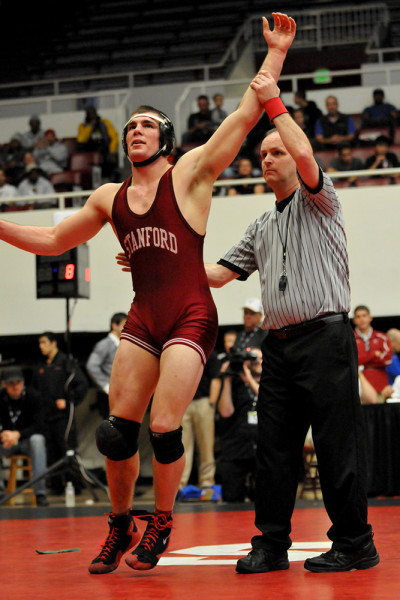
Mango and Scherer, who also emerged victorious in their swan songs on the Farm, will look forward to one final opportunity to shine at the collegiate level at the NCAAs after a rousing send-off from their home crowd.
“I couldn’t imagine going out any better way,” said a beaming Scherer after the match. “Very, very surreal feeling and very exciting. I loved it.”
“It always means a lot to compete in front of the fans here and I’m definitely going to miss it, so it was definitely a sentimental moment for me,” Mango added.
Marchok was unable to finish the meet with a sixth NCAA bid for the Cardinal as he ended up injured in the tiebreak match for true second place, from which the victor would have advanced to the national tournament.
Although the Cardinal had failed to achieve one of the primary “firsts” that Borrelli had identified before the season — it came in second to Oregon State and again missed out on its first conference title — it’s difficult to imagine any significant disappointment for Stanford wrestling at the culmination of arguably the most successful season in program history. With five qualifiers for the NCAA Championship – two of whom will return next season — and a young corps of talented up-and-coming wrestlers who forged deep bonds with one another while having been taught to seek and achieve victory, there is no reason think that the 2014 Stanford wrestling team is a one-hit wonder.
“Even though we’ll miss [the seniors], they have still set good examples for all of the younger guys to follow so that we can rise up to the position that they were in and set a good example for the next incoming generation of guys,” Wilson said.
The program not only transformed itself from mediocrity to excellence, but also instilled a new and intimate team culture that brought teammates closer together and simultaneous taught them to expect nothing but the best from themselves and one another. Even more remarkably, the resurgence occurred in the span of just half a decade. Shifts in culture necessitate both time and belief in the new system to be successful, and Stanford wrestling’s turnaround has been a testament to the ability for a group of young men, united by a common goal, to learn from one another and grow together into a program capable of success at the highest level.
“Coach Borrelli has held us to high standards,” Wilson said. “He’s changed this whole program to be focused on hard work and dedication and perseverance and that it’s not all about us. We’re doing it for everyone else. So I think when you go out on the mat and you know that you’re doing it for everyone watching you and you’re not just doing it for yourself, it just gives you so much more strength and determination.”
One of the walls of the wrestling room in the basement of the Arrillaga Family Sports Center reads, “Stanford: Home of Scholar-Athletes” in faded white lettering on a dull red background. The room almost feels like a relic of times past, with its unfinished ceiling, plain red mat and unforgiving white walls unchanging and unbroken. The message itself represents one of the traditional values of the school that has also been constant throughout the years. But in that room and under that sign, day in and day out, almost in a striking juxtaposition to the scene, practices a dynamic group of individuals that has been responsible for a vibrant transformation from something forgettable to something special.
“Four or five years ago, we’d come in and do a workout, and people would be complaining and people wouldn’t work as hard,” Meyer said. “But here now, everyone has really bought into the program and everyone is trying as hard as they can.”
“They really know what it means to be a champion,” Mango added. “For those guys to come in at that level speaks to where the program is and where the program is going.”
Contact Do-Hyoung Park at dpark027 ‘at’ stanford.edu and Tweet at him @dohyoungpark.
